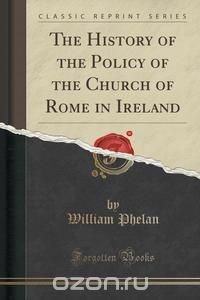Excerpt from The History of the Policy of the Church of Rome in Ireland
To effect this, their emancipation from the thraldom of Rome seemed an essential and a preliminary step. His Christian patriotism was that of one who lived and laboured for the good of his country: - not of that modern school of patriots, who assume the name the better to disguise selfish purposes.
He did not regard matters through the distorting medium of party optics, but taking a broad and comprehensive view, formed his own opinion as to what would best conduce to the real benefit of his country. Instead of advocating any diminution of British influence and authority, or of supposing it inconsistent with the welfare of his native land, he has recorded his opinion that England's weakness, and not her strength, has been the bane of Ireland.
The territorial extent of England's rule in that country was, for a long time, very small. From the reign of King Henry the Second to that of King James the First, it is thus graphically described by Dr. Phelan at p. 71: - "A level district round the capital, containing the small shires of Louth, Meath, Kildare, and Dublin, limited the range of the English law, the jurisdiction of the Viceroy, and, except on some rare occasions, the ambition of the crown.
About the Publisher
Forgotten Books publishes hundreds of thousands of rare and classic books. Find more at www.forgottenbooks.com
This book is a reproduction of an important historical work. Forgotten Books uses state-of-the-art technology to digitally reconstruct the work, preserving the original format whilst repairing imperfections present in the aged copy. In rare cases, an imperfection in the original, such as a blemish or missing page, may be replicated in our edition. We do, however, repair the vast majority of imperfections successfully; any imperfections that remain are intentionally left to preserve the state of such historical works. Это и многое другое вы найдете в книге The History of the Policy of the Church of Rome in Ireland (Classic Reprint) (William Phelan)
